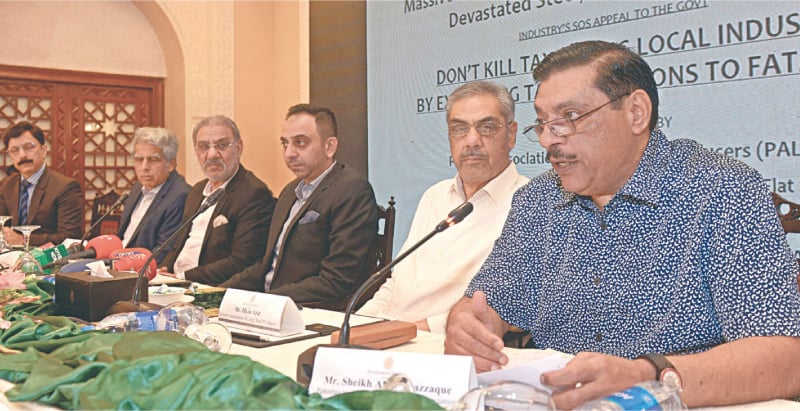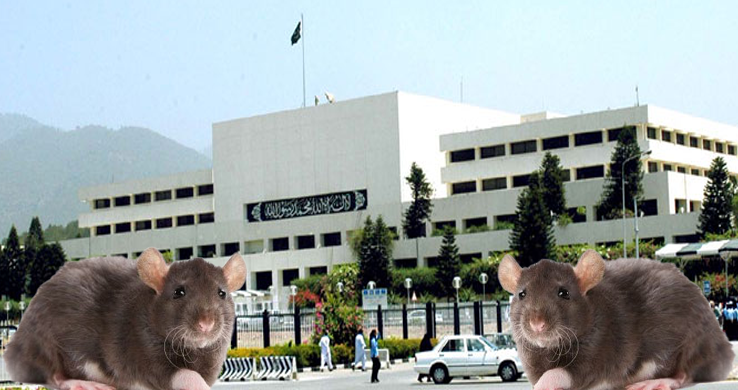Mohsin Siddiqui (Chief Reporter)
Representatives from various sectors have voiced their concerns over the misuse of the tax incentive package for the erstwhile Federally Administered Tribal Areas (FATA) and Provincially Administered Tribal Areas (PATA). They claim that the concessions announced in 2019 are significantly damaging the ghee, edible oil, and steel industries throughout the country. At a news conference in Islamabad on Monday, prominent figures from these sectors called on the government to abolish the exemptions granted to industries in these regions.
Sheikh Abdul Razzak, Chairman of the Pakistan Vanaspati Manufacturers Association (PVMA), highlighted the issues caused by the tax concessions provided to the FATA and PATA regions. These areas have been granted complete exemptions from income tax, sales tax (both at the local and import stages), customs duty (on plant and machinery imports), turnover tax, and withholding income tax on local supplies. Razzak pointed out that these exemptions create a significant competitive disparity of around 27% between units in FATA/PATA and those in the rest of Pakistan.
Razzak explained that with a population of approximately 6.25 million, the ghee and edible oil requirement in FATA and PATA should be around 52,000 tonnes for the period of January to May 2024, based on an annual per capita consumption of 20 kilograms. However, the ghee units in these exempted areas have imported a staggering 180,000 tonnes of edible oil, including palm oil, within just five months. This discrepancy clearly indicates that the ghee and oil mills in the exempted regions are selling their products in the mainland, extending even to Punjab and parts of Sindh over the past five years.
The steel sector is facing similar challenges due to the tax exemptions, with tax benefits amounting to around Rs50,000 per tonne for steel products. Khurram Mughal, CEO of Mughal Steels, and Khawar Suddiquie of Aisha Steels expressed their concerns, revealing that many steel units operating in the Hattar, Gadoon, and Hayatabad industrial estates have shut down. Specifically, 16 steel units in the Hattar industrial estate and eight in Islamabad have ceased operations.
Mughal noted that the China-Pakistan Economic Corridor (CPEC)-related steel projects, which Chinese investors planned to establish in the Rashakai Economic Zone, have been abandoned due to the tax issues related to FATA/PATA. These tax exemptions have led to significant disruptions in the steel industry, causing a decline in local steel production and investment.
In addition to the ghee, edible oil, and steel industries, the Fruit Juice Council (FJC) has also raised concerns regarding the tax regime. The FJC has urged the government to abolish the 20% Federal Excise Duty (FED) and the 18% General Sales Tax (GST) on packaged fruit juices in the upcoming Federal Budget 2024-25. Aatekah Mir Khan, a representative of the FJC, explained that the sudden imposition of these taxes in the Budget 2023-24 resulted in a 41% drop in industry volumes.
The FJC, which includes major players such as CitroPak, Haleeb, Nestlé, PepsiCo, Popular, Shezan, and TetraPak, with an annual turnover of about Rs60 billion in 2022, employs over 10,000 people. The council argues that these taxes are directly impacting the rural economy of fruit farmers, particularly in Punjab, and are detrimental to the overall fruit juice industry.
The representatives from the ghee, edible oil, steel, and fruit juice industries collectively urge the government to reconsider the tax exemptions provided to FATA/PATA. They argue that these exemptions create an uneven playing field, leading to unfair competition and significant financial losses for businesses operating in other parts of the country.
The industries call for a revision of the current tax policies to ensure fair competition and support local businesses. They emphasize the need for a balanced approach that fosters economic growth without disproportionately benefiting specific regions at the expense of others.
To address these concerns, industry leaders suggest the following steps:
Abolish Tax Exemptions: Remove the tax exemptions granted to industries in FATA/PATA to level the playing field.
Review Tax Policies: Conduct a comprehensive review of current tax policies to identify and rectify disparities that negatively impact certain sectors.
Support Local Industries: Implement measures to support local industries, such as reducing tax rates and providing incentives for investment in plant and machinery.
Enhance Transparency: Ensure transparency in tax administration to prevent misuse of exemptions and reduce the potential for corruption.
By taking these steps, the government can help create a more equitable business environment that promotes sustainable economic growth across all regions of Pakistan.




